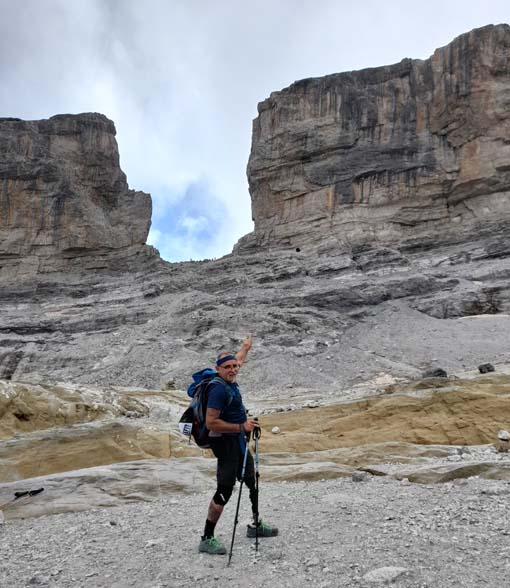Always higher with Arnaud!

Nothing can stop Arnaud Guignebert, not even a femoral prosthesis! For 5 years, he has been hiking trails and always aims higher: 3000 m, 4000 m, with Mont Blanc in his sights.
Guidetti supports him in his hiking and trekking by providing him with poles adapted to his practice.
How long have you had a prosthesis?
I have been a femoral amputee for 35 years. I am a very big consumer of prostheses and I have been able to test many models while helping manufacturers with their developments.
When I got back into competitive motorcycling, the manufacturer developed a specific prosthesis for me. For hiking, I first had a normal but robotic prosthesis. But I wore it out in 10-11 months compared to 2-3 years with conventional use. I had problems with autonomy and recharging, so the French manufacturer Protéor had me test a model with lithium batteries. Now, I have a knee classified as "hyper sport" with a very good foot. This allows me to have good support and less fatigue on descents.
When did you start hiking?
I have always been physically active through my work but I have only been hiking for five years. I have always been attracted to the mountains, a bit of climbing, going higher and higher, touching on mountaineering...
How important are hiking poles for you?
At first, for me, poles were like crutches, a step backward, a regression... Finally, thanks to my partner who already used them and who gave me my first Guidetti poles, I got into it. I tried them, I liked them and now, I can't do without them!
My poles are very useful for stabilizing myself and strengthening my support. In many situations, without the poles, I would have fallen.
You should know that the prosthesis doesn't react as naturally as natural knees - especially on uneven terrain, the prosthesis can get stuck and the poles help me hold on in these cases. I get much more tired on the descent and I have to put more weight on it. I have complete confidence in my telescopic aluminum poles (T3 Garnet model). They are a huge element of safety and reassurance. As with the prosthesis, I have to have complete confidence in my equipment.
Once you've tried poles, you can't do without them. Without them, I'm lost and I don't know what to do with my hands!
And then, considering everything I put them through, I'm reassured to know that the Guidetti after-sales service is available for annual maintenance and that I can change worn parts at any time.
What hikes did you do this summer?
For the second year in a row, I had planned to climb Mont Blanc. But this year again, I had to give up on this dream. The weather conditions were not favorable and the climb was too dangerous. For me to attempt this climb, it really needs optimal conditions because I walk slower than average and it doesn't take more than 20 centimeters of fresh snow.
Despite this slight disappointment, I was able to do some very beautiful hikes and beautiful peaks or passes over 3000m, including
- Col de Labby 3328 m
- Col de la Réchasse 3212 m, with a large section on glacier
Every year, I cover between 400 and 500 kilometers on hiking trails and almost 40,000 meters of elevation gain.
I go with someone on the most challenging outings, with passages on glaciers or ridge routes that require being roped. Otherwise, I walk independently with my partner.
How do you prepare for your climbs physically?
I don't have any specific physical training, apart from a bit of rowing to strengthen my legs.
What are your next goals or hikes?
I plan to go to Peru in June 2023 and do a 4000m in the Alps.
I still have the Mont Blanc goal in mind, maybe during the summer. You should know that the ascent of Mont Blanc has never been made by a femoral amputee.
Another challenge, I would like to take up downhill cycling... and still a bit of motorcycle competition with an endurance race (in a crew) in a category that I don't know, and get back on the downhill ski slopes.
A year that should be very busy!
.jpg)
.jpg)
Interview by Aurélie Joubin on November 21, 2022

